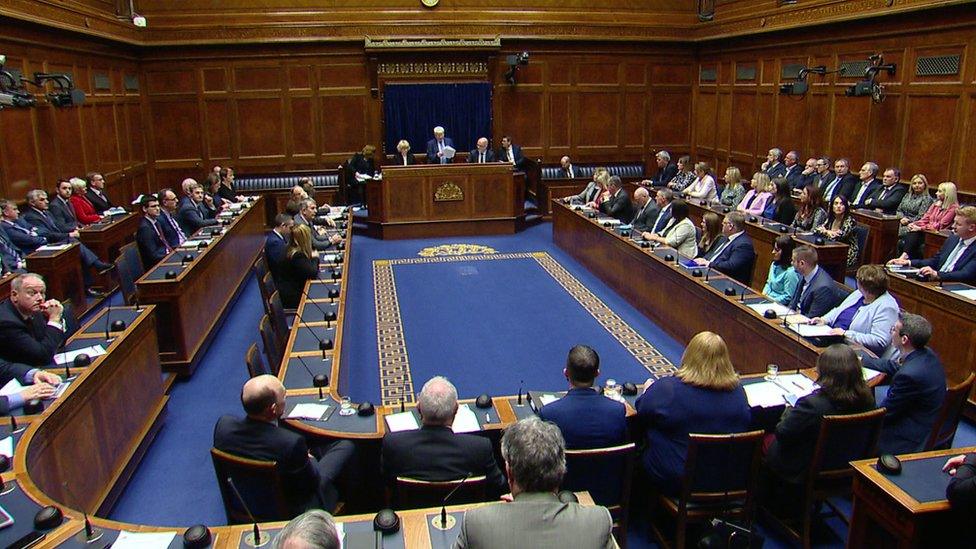Stormont deal: Financial package 'falls way short'
- Published
- comments
The UK government will "strongly support" the new Stormont executive, says Boris Johnson
The government's offer for extra money as part of the deal to restore Stormont "falls way short" of what was promised, Finance Minister Conor Murphy has said.
Mr Murphy was speaking after the Stormont parties met Secretary of State Julian Smith to discuss how much will be allocated.
The finance minister refused to comment on how much exactly had been proposed.
Earlier the prime minister said the government had made "huge commitments" as part of the deal.
The British and Irish prime ministers were in Belfast on Monday to mark the return of devolution after a three-year impasse.
Speaking to the media, Mr Johnson did not state how much money would be provided to support the deal, saying it was not about money but leadership.
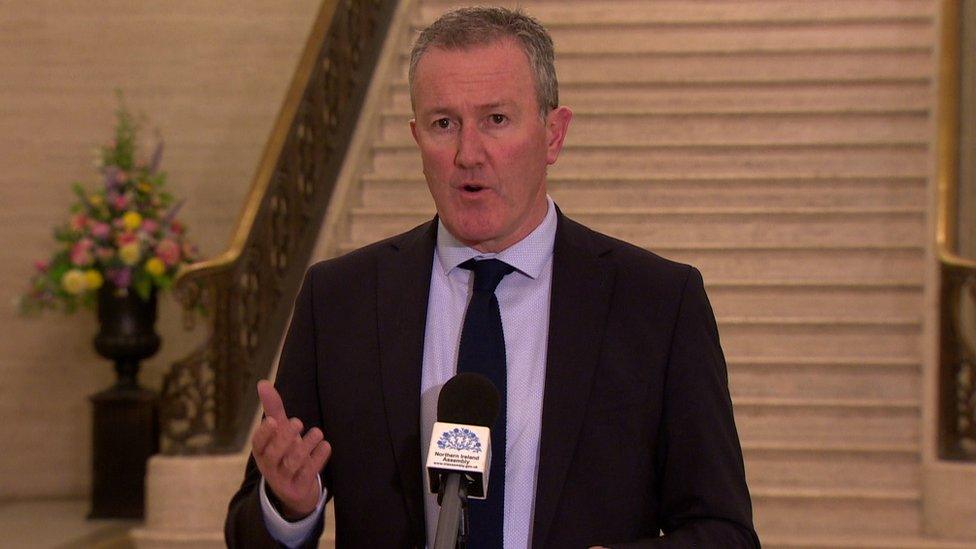
Mr Murphy said departmental officials would examine the figures tonight
On Monday evening Mr Murphy said: "As far as I'm concerned the conversation hasn't ended, there's still work to be done.
"We have to analyse the verbal figures that were given to us tonight by the secretary of state, but my initial read of them is they fall way short and I wouldn't tend to accept that."
He said the government had made commitments to the Stormont parties.
"They can't come today and congratulate us for living up to our commitments and then not live up to their own," he said.
Mr Murphy had previously said more than £1.5bn was needed.
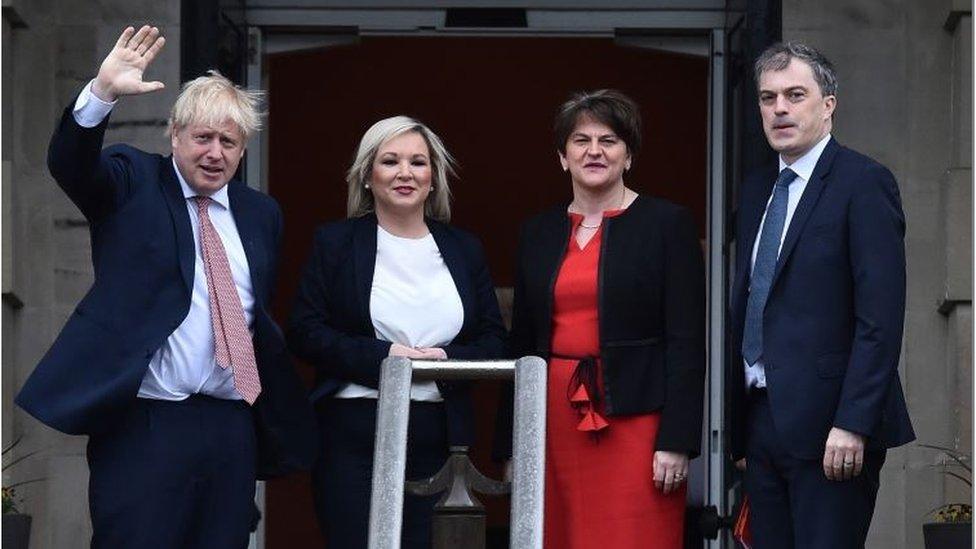
Boris Johnson is greeted by the first and deputy first ministers and NI Secretary Julian Smith
'Conversation about funding'
The prime minister met the new executive ministers on Monday morning, having been greeted by First Minister Arlene Foster and Deputy First Minister Michelle O'Neill.
Speaking afterwards, Mr Johnson said the government would "strongly support" the new power-sharing executive.
"What's so great about today is, as I say, that Northern Ireland politicians have put aside differences, stepped up to the plate and shown leadership," he added.
The prime minister said this was a chance to "deliver on the priorities of the people" in terms of health, education and crime fighting.
He acknowledged that there was a "certain amount of conversation about funding" and whether the government was going to be supportive.
Mr Johnson said the government was making "huge commitments" for health.
"Yes of course we are going to be supportive, but it's not just about money," he said.
"We are listening very carefully and will certainly do everything we can to support."
Allow X content?
This article contains content provided by X. We ask for your permission before anything is loaded, as they may be using cookies and other technologies. You may want to read X’s cookie policy, external and privacy policy, external before accepting. To view this content choose ‘accept and continue’.
Taoiseach (Irish Prime Minister) Leo Varadkar said the Good Friday Agreement "is working again".
"North-south cooperation is going to resume. We are going to beef up and deepen cooperation."
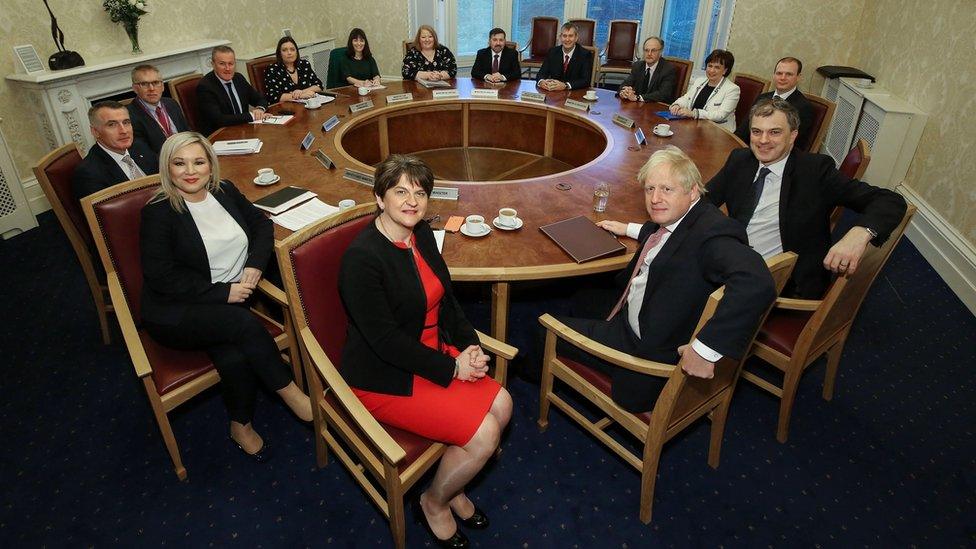
Prime Minister Boris Johnson meeting the new executive ministers at Stormont Castle
First Minister Arlene Foster said the prime minister must "step up to the plate" and deliver what the government has promised in extra funding for Northern Ireland.
"We need significant and sustained investment, not just this year but over a number of years. This is crucial in ensuring transformation in areas such as health and also our road and water infrastructures," she said.
Mrs Foster also said the possibility of water charges being introduced as a means of raising revenue was not supported by anyone in the executive.
Deputy First Minister Michelle O'Neill said she had impressed upon the two prime ministers "the importance of coming through with the funding promised as part of the deal".
"All executive ministers are committed to working together to tackle some very serious issues in our society and across public services but, quite simply, we need the money to make it happen.
"We have done our bit and I look forward to the fulfilment of the commitments made by the two governments to let us get to work."


We'll never know exactly what the new ministers said to Boris Johnson as they met him inside Stormont Castle, but one thing's for sure, money talks.
The government has been tight-lipped when it comes to revealing how much it's prepared to stump up for Stormont this time, but there are rumours of another few billion pounds coming our way.
The executive has a mountain to climb in terms of tackling waiting lists, school budgets and roads projects, with ministers relying on a big pot of money to take the necessary decisions.
Asked about the exact figure, Boris Johnson said it wasn't "just about money" - an answer that might set alarm bells ringing.
The party leaders will want to ensure the government doesn't go back on its word - so they'll be meeting Julian Smith at some point on Monday to go over the final details of the deal.

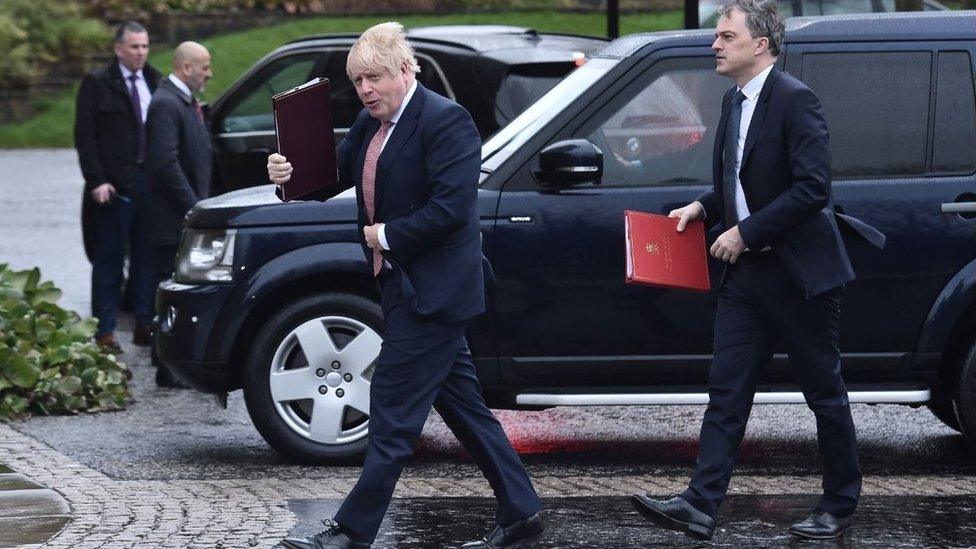
Boris Johnson arrives at Stormont to meet the new Northern Ireland Executive
If you are reading this page on the BBC News app, you will need to visit the mobile version of the BBC website to submit your question on this topic.
On Saturday, a new power sharing government was formed by Stormont's five main parties.
They agreed a deal with the governments that includes extra funding for Northern Ireland, but the exact figure is not yet known.
The deal - entitled New Decade, New Approach - was reached on Friday after months of negotiations between the parties and the two governments.
Stormont's power-sharing coalition, led by the DUP and Sinn Féin, had collapsed in January 2017 after a row over a green energy scandal.
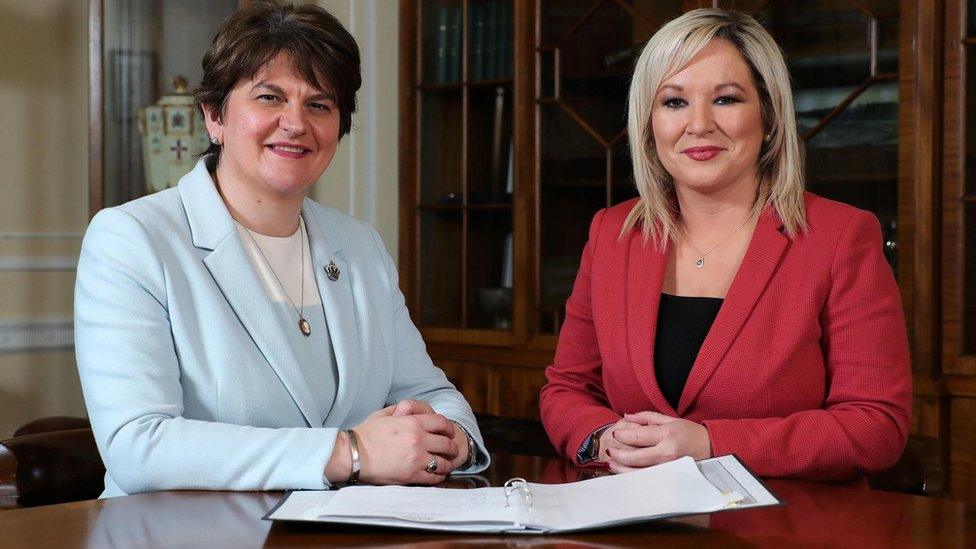
Arlene Foster and Michelle O'Neill were appointed first and deputy first ministers on Saturday
The return of devolution means the executive can now take decisions that had been stalled due to the three-year absence of ministers.
The executive is expected to hold its first meeting on Tuesday, the same day that the new chairs of Stormont's scrutiny committees are likely to be chosen.
- Published10 January 2020
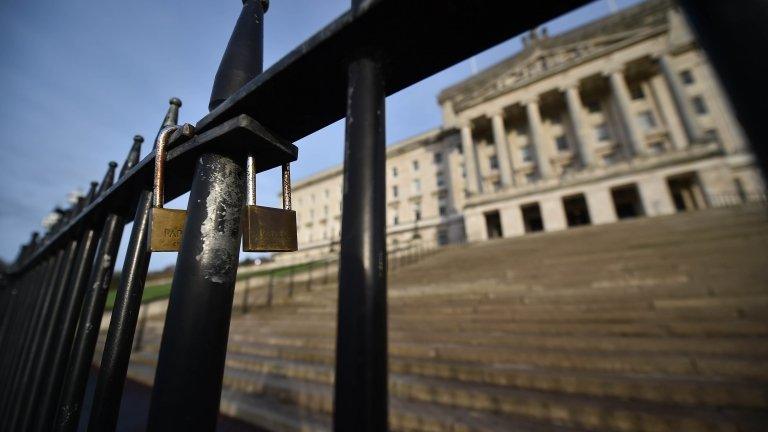
- Published12 January 2020

- Published11 January 2020
